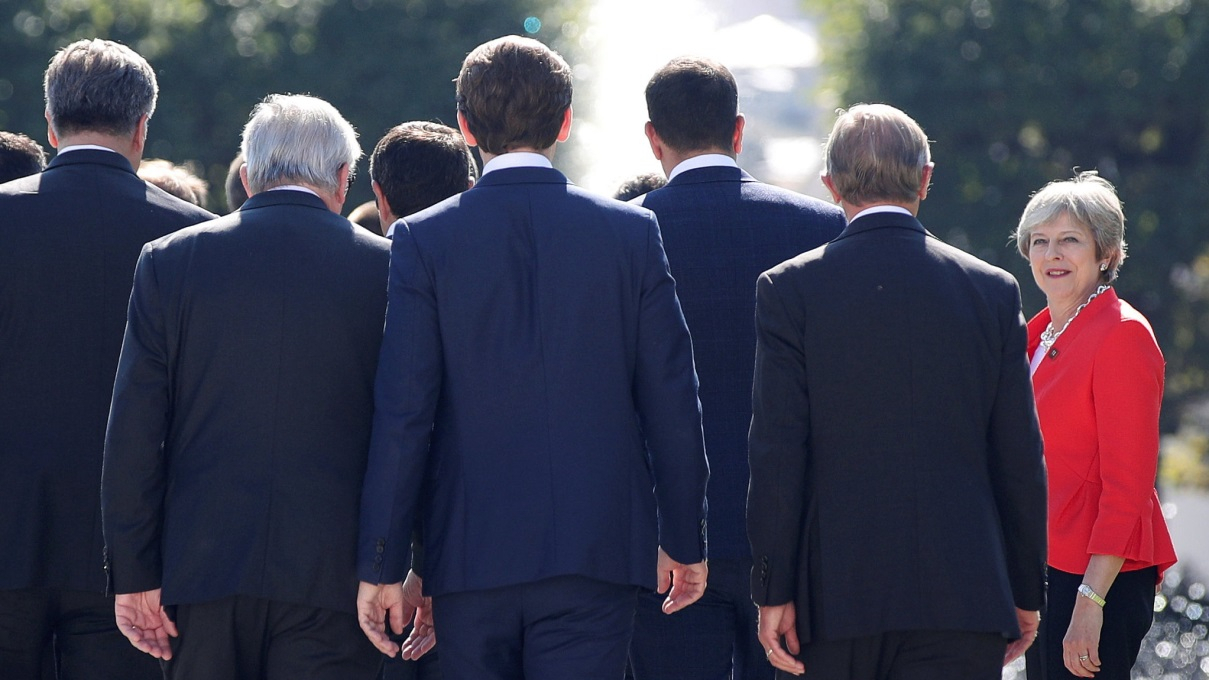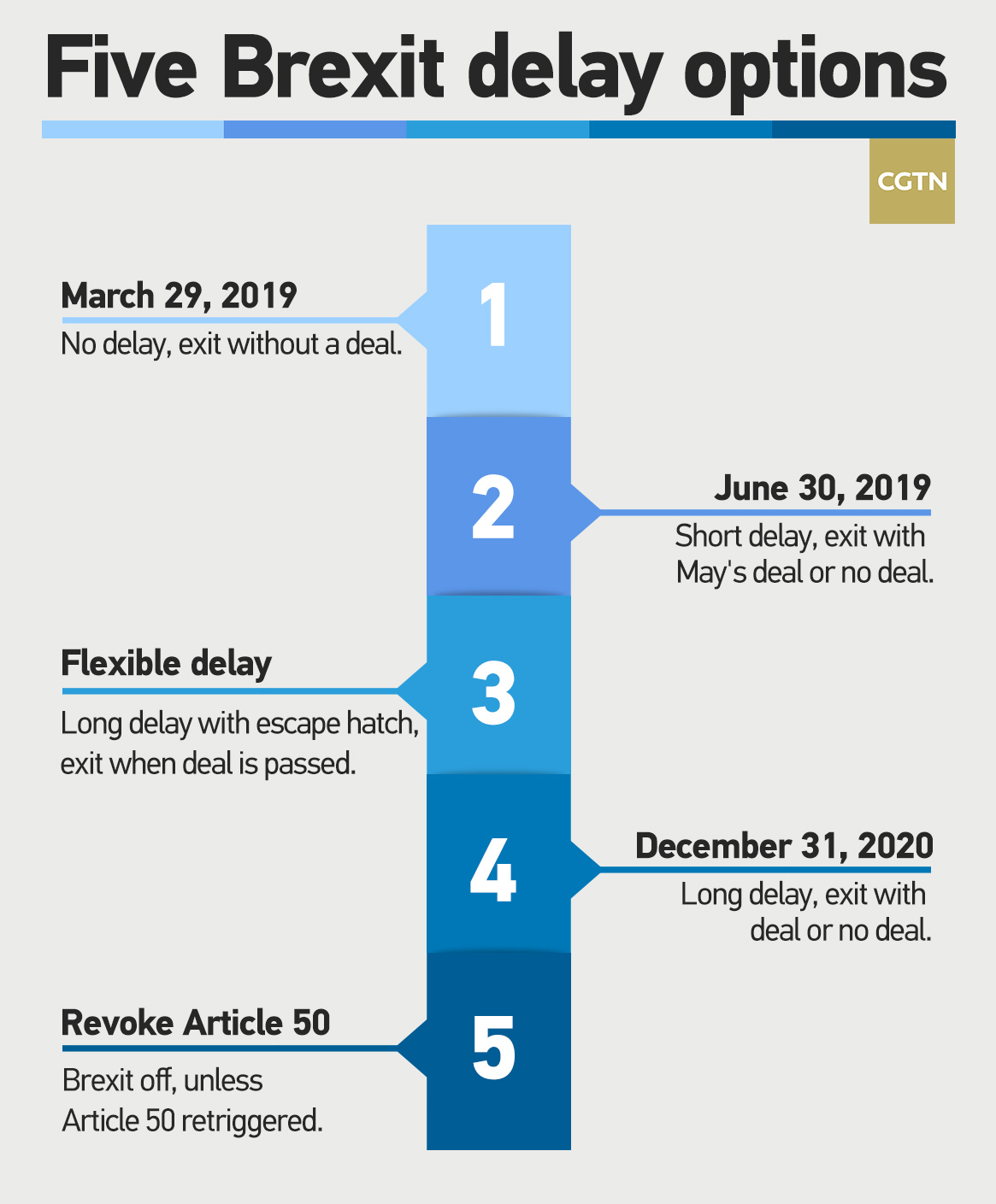
Europe
18:01, 20-Mar-2019
Brexit delay? Five options for May and the EU
By John Goodrich

British Prime Minister Theresa May will travel to Brussels on Thursday in the hope of persuading the leaders of the other 27 EU member states to agree to extend the Brexit date beyond March 29.
May is expected to ask for an extension to Article 50 of around three months, but there is no guarantee that the leaders of all 27 other EU members will agree unless the appeal comes with a clear plan. They could reject the prime minister's request, make a counter proposal, or add multiple conditions.

1. No delay
Leave with no-deal on March 29.
Britain: MPs have voted for a delay and against a no-deal. However, the legal position remains that – without a delay or revocation of Article 50 – Britain will leave the EU without a deal on March 29. This also remains the preferred option for a number of hardliners in May's Conservative Party.
EU: A no-deal exit – particularly at such a late stage – would be economically damaging for both the EU and the UK. The EU will likely be receptive to a delay that mitigates the risk of Britain leaving without a deal, but also wants certainty about the way forward.
Scenario: A March 29 exit would take place if a delay is not agreed, or if the UK failed to change the current law. That could happen if the conditions attached to a delay are not deemed acceptable, or if the terms – for example if a delay were conditional on May's deal passing next week – were not met.
2. Short delay
Article 50 extended to June 30.
Britain: May still hopes to push through her twice-defeated Brexit deal, and is expected to request a three-month delay on Thursday to allow the agreement to be passed and the required legislation to be approved. Three months probably wouldn't allow another option to be explored without a further extension. May could try to negotiate a short-delay on condition her deal passes – and frame the choice in a vote next week as her deal or no deal.
EU: The EU would almost certainly agree to the request if May's deal was passed in parliament, but another vote on her agreement can't take place until after the summit – and only if the proposal is substantially changed. The bloc could agree to a short delay conditional on a deal being passed next week or by April 11, the date by which Britain would need to pass legislation to take part in the European Parliament elections in May.
Scenario: A three-month delay would probably end either with May's deal being passed or a no-deal at the end of June. There is nothing legally preventing a request for another extension when the three months are up, but politically it would be tough.
3. Flexible extension
Delay ends when a deal is passed.
Britain: May could request an option that keeps her deal alive but allows a provision for the exit date to be flexible. Given that her cabinet is split on the issue, this could be a useful compromise. It would probably mean a delay of up to two years, with the proviso that agreement on the prime minister's deal or an alternative would lead to an earlier exit.
EU: The EU wants to offer a delay only if there is confidence that it will be constructively used. If it were to agree to such a mechanism, it would include several caveats – for example on participation in the European Parliament elections and possibly on a referendum or general election if a deal isn't struck by a certain date.
Scenario: A flexible extension would keep multiple options open, but would be a difficult sell for May. It would also reduce leverage she has over MPs. An option of a short or long extension – rather than a mix of both – dependent on events in the next week could be more realistic.
4. Long delay
Delay of up to two years.
Britain: Britain could ask for a long delay – with predictions ranging from nine months to two years. This would be a signal that May's deal is dead in its current form, and would mean a fundamental rethink. It would also necessitate Britons voting in European Parliament elections in May.
EU: European Council President Donald Tusk has signaled that a two-year extension should be considered. It would only be granted if Britain fundamentally rethought its Brexit strategy, and would probably require a commitment to a new referendum, a general election or a softer approach to exit.
Scenario: May would be reluctant to sign on, not least because it would be almost impossible for her to remain as prime minister, but a long delay is favored by some in the EU as the most likely route to an orderly exit and could be offered.
5. Revoke Article 50
Brexit off, unless Article 50 retriggered.
Britain: Britain can revoke Article 50, essentially cancelling the Brexit process, at any time. Some senior MPs back revoking Article 50 and retriggering when a workable plan is on the table. How easily the process could be restarted – legally or politically – is untested.
EU: The EU would have no official say, but would likely welcome the move.
Scenario: This is the nuclear option for May. It would be interpreted – even if the intention was to retrigger the process in the future – as ignoring the 2016 referendum result. It's difficult to see how it could happen without another referendum or a general election in which the winning party made cancelling Brexit part of its platform.

SITEMAP
Copyright © 2018 CGTN. Beijing ICP prepared NO.16065310-3
Copyright © 2018 CGTN. Beijing ICP prepared NO.16065310-3